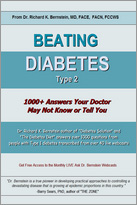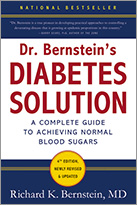If ever it is necessary for you to become a hospital patient in the United States, the chances are overwhelming that no reasonable thought will be given to controlling your blood sugar. Most of the medical orthodoxy doesn’t do it anywhere else, so why should they do it in the hospital?
The reasons, of course, are many: lack of blood sugar control skills on the part of most hospital medical staff; unawareness of the importance of normal or near-normal blood sugars in the face of illness or surgery; and an almost pathological fear of hypoglycemia (and the potential for lawsuits if it occurs). Many if not most hospital dietitians have been indoctrinated by the ADA, with the result that diabetic inpatients are forced to eat “normal” high-carbohydrate foods and are deprived of protein and fat. Some of my patients tell stories of having to sneak in their own insulin, throw out hospital food, and fight tooth and nail with well-meaning but uninformed hospital personnel.
Many studies of hospitalized patients have demonstrated that elevated blood sugar delays surgical healing, delays recovery from infections, and leaves patients open to new infection. It also has been shown to increase death rate of patients who have been hospitalized from heart attack or stroke, and increases the likelihood of a new stroke or heart attack.
What can you do to help keep your blood sugars under control while in the hospital?
Most of my patients live great distances from my office, so that I am not the admitting physician or surgeon when they are hospitalized, and as such I am not in a position to write their orders, help control their diets, and directly oversee their medical care.
After sharing the frustration of my patients over the years, I’ve come up with a letter that has worked repeatedly for elective hospitalization, such as for surgeries planned in advance. As you will see, it relies on the prevailing fear of litigation that appropriately permeates the medical care system in this country. You or your diabetologist should send this letter to the admitting physician, with a copy to the hospital administrator. I’ve composed the letter as if you were writing it; since the odds are that you are not under the care of a diabetologist. It can, of course, be modified to suit your circumstances.
Dear Dr. __________
I am scheduled for admission to your hospital on _______
I have Type (1 or 2) diabetes and am naturally concerned about control of my blood sugars while hospitalized.
It is now generally accepted that elevated blood sugar levels impede recovery, prolong hospitalization, and increase the incidence of hospital death. Major health problems brought about by inappropriate blood sugar elevations during hospitalization have justifiably led to litigation.
Since I have been successful at keeping my blood sugars essentially normal around the clock, I naturally expect equivalent care while I’m in the hands of medical professionals.
I currently take the following medications for controlling my blood sugars:
[List here doses, times, and purposes of medications: “basal insulin (or OHA) to cover the fasting state – must receive even if not eating.” “prelunch (breakfast, supper) insulin (or OHA), to be skipped if meal is skipped.” Detail also any use of insulin or glucose tablets for correcting off-target blood sugars, etc. Also indicate your target blood sugar. You may also include a sample log sheet and request that all medications used by the hospital be listed on it if you are not capable of listing them yourself.]
My hospital orders should call for a “normal diet” and not a “diabetic diet,” so that I can select my own meals.
Routine intravenous fluids should not contain caloric substances such as glucose, fructose, lactose, or lactated Ringer’s solution (except for treatment of blood sugars that are below my target). All of these substances will raise my blood sugar to unacceptable levels.
Normal or half-normal saline solutions are perfectly adequate for routine hydration.
If I am conscious and without cognitive impairment, I should have full responsibility for treatment of my diabetes – without outside interference.
My blood sugar meter and blood sugar control medications, including insulin syringes, should not be confiscated by hospital personnel. This is a barbaric practice that is rapidly being abandoned in modern hospitals.*
If I am unable to care for my own blood sugars, I expect that the hospital staff will exercise every effort to maintain my blood sugars within the range of [00-00]
Sincerely,
Cc: [Hospital administrator]
[Close relative or friend]
*Many hospital pharmacies do not stock the products that we commonly utilize, such as 25-30 unit insulin syringes, ultralente insulin, and Humalog (lispro).




